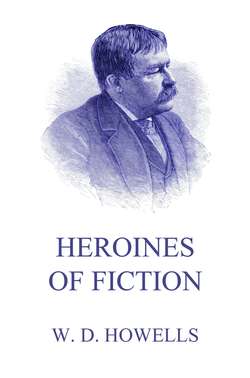Читать книгу Heroines Of Fiction - William Dean Howells - Страница 24
На сайте Литреса книга снята с продажи.
III
ОглавлениеAs any practiced reader of fiction could easily demonstrate, this is not the sort of rescue to bring about a reconciliation between lovers in a true novel. There it must be something more formidable than a naughty little boy that the heroine is saved from: it must be a deadly miscreant, or a mad bull, or a frightened horse, or an express train, or a sinking ship. Still it cannot be denied that this simple, this homely scene, is very pretty, and is very like things that happen in life, where there is reason to think love is oftener shown in quality than quantity, and does its effect, as perfectly in the little as in the great events. Even the most tremendous incident of the book, the famous passage which made Tennyson, when he visited Lyme Regis, wish to see first of all the place where Louisa Musgrove fell from the Cobb, has hardly heroic proportions, though it is of greater intensity in its lifelikeness, and it reverses the relations of Anne and Wentworth in the characters of helper and helped.
" There was too much wind to make the high part of the new Cobb pleasant for the ladies, and they agreed to get down the steps to the lower, and all were contented to pass quietly and safely down the steep steps excepting Louisa; she must be jumped down them by Captain Wentworth. . . . She was safely down, and instantly to shew her enjoyment, ran up the steps to be jumped down again. He advised her against it, thought the jar too great; but no, he reasoned and talked in vain, she smiled and said, ' I am determined I will': he put out his hands; she was too precipitate by half a second; she fell on the pavement on the Lower Cobb, and was taken up lifeless! There was no wound, no visible bruise; but her eyes were closed, she breathed not, her face was like death. . . . Captain Wentworth, who had caught her up, knelt with her in his arms, looking on her with a face as pallid as her own in an agony of silence. 'She is dead!' screamed Mary, catching hold of her husband, and contributing with her own horror to make him immovable; and in the same moment, Henrietta, sinking under the conviction, lost her senses, too, and would have fallen on the steps, but for Captain Benwick and Anne, who supported her between them. ' Is there no one to help me?' were the first words that burst from Captain Wentworth. 'Go to him; go to him', cried Anne;' for Heaven's sake, go to him. Leave me and go to him. Rub her hands, rub her temples; here are salts; take them, take them. ' Louisa was raised up and supported between them. Everything was done that Anne had prompted, but in vain; while Captain Wentworth, staggering against the wall for his support, exclaimed in the bitterest agony, 'Oh, God! Her father and mother!' 'A surgeon!' said Anne. He caught at the word; it seemed to rouse him at once; and saying only, 'True, true; a surgeon this instant.' . . . Anne, attending with all the strength and zeal and thought, which instinct supplied, to Henrietta, still tried, at intervals, to suggest comfort to the others, tried to quiet Maty, to animate Charles, to assuage the feelings of Captain Wentworth. Both seemed to look to her for direction. 'Anne, Anne,' cried Charles, 'what in Heaven's name is to be done next?' Captain Wentworth's eyes were also turned towards her. ' Had she not better be carried to the inn? Yes, I am sure; carry her to the inn.' 'Yes, yes, to the inn,' repeated Wentworth. . . . ' I will carry her myself."'
Anne has to show, with all this presence of mind, a greatness of mind superior to the misery of imagining that Wentworth is in love with Louisa, and that his impassioned remorse is an expression of his love. Only when they are going home together, to tell Louisa's parents of the accident, does she make one meek little tacit reflection in her own behalf. "'Don't talk of it, don't talk of it,' he cried. 'Oh, God, that I had not given way to her at that fatal moment! Had I done as 1 ought! But so eager and so resolute! Dear, sweet Louisa!' Anne wondered whether it ever occurred to him now to question the justness of his own previous opinion as to the universal felicity and advantage of firmness of character. . . . She thought it could scarcely escape him to feel that a persuadable temper might sometimes be as much in favor of happiness as a very resolute character."
